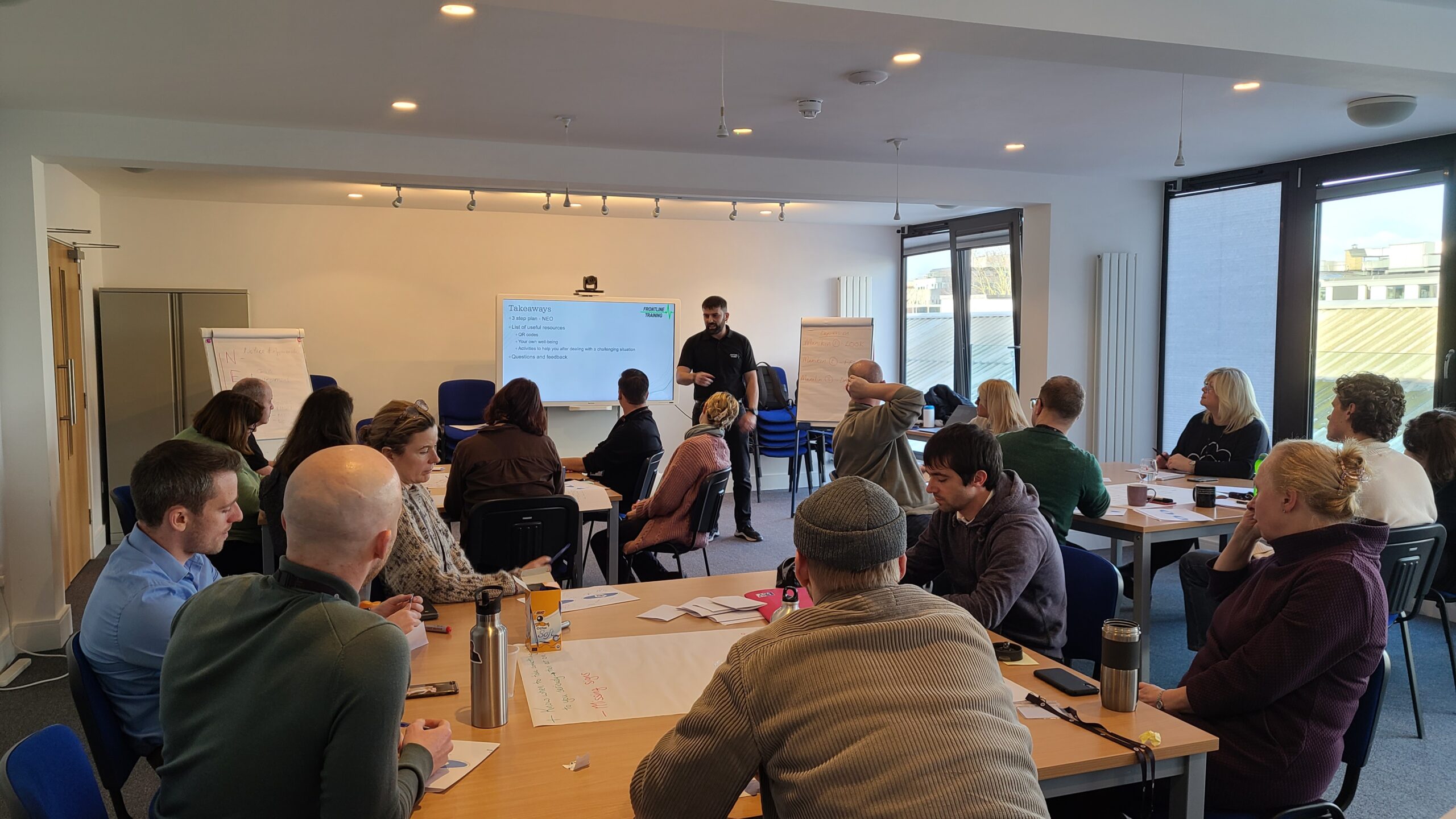Mental Health First Aid
Mental Health First Aid (MHFA) is an internationally recognised training course which teaches people how to spot the signs and symptoms of mental ill health and provide help on a first aid basis. Supporting the people around us who are experiencing poor mental health has become a priority for many people and the organisations they work in. MHFA won’t teach you to be a therapist, but just like physical first aid, it will teach you to listen, reassure and respond, even in a crisis.
With 1 in 4 people in the UK likely to experience a mental health issue each year, it is of the upmost importance that workplaces are taking an active role in supporting the wellbeing of their staff. A Mental Health First Aider can help to facilitate this.
A greater understanding of common mental health issues has developed over the last few years and there has been a rise in the number of people who want to act as a Mental Health First Aider, to support and guide those around them.
Our regulated and nationally recognised qualifications create Mental Health First Aiders who can genuinely make a difference within their workplace, giving them the tools to actively support colleagues who are struggling, and also the ability and personal resilience required to put those tools into practice.
Mental Health First Aid Courses for Adults
The focus is purely on scenarios involving adults experiencing poor mental health at work

Mental Health First Aid In The Workplace
In this 2-day course, learners gain skills to promote workplace mental health. They learn about understanding mental health importance, self-awareness as a Mental Health First Aider, common conditions, and supporting methods.

Understanding Mental Health In The Workplace
In this 1-day course, learners understand workplace mental health importance and their role in recognising issues. Topics include understanding mental health, promoting positive workplace mental health, common conditions, and action plans.

Introduction To Mental Health In The Workplace
In this half-day course, learners explore depression, suicide, and stress. They learn about using appropriate language to support others and emphasise the importance of self-care for improving mental health.
Mental Health First Aid FAQs
What is the role of a Mental Health First Aider?
The primary responsibility of a Mental Health First Aider is to assist employees facing mental health challenges or distress in the workplace. This assistance ranges from engaging in non-judgmental conversations with colleagues to directing them to the appropriate support resources.
The Mental Health First Aider role includes:
- Recognising early signs and symptoms of common mental health issues in the workplace.
- Having the necessary skills to engage in supportive and non-judgmental conversations with those in need.
- Possessing knowledge and confidence to guide colleagues toward professional support if required.
- Advocating for increased awareness of mental health in the workplace and actively working to reduce stigma.
What is the impact of mental illness in the workplace?
Approximately 1 in 4 people in the UK will experience a mental illness each year. In 2016, 15.8 million UK work days were lost due to mental illness.*
The largest causes of sickness absence for our county’s workforce is depression, stress, and anxiety. Mental illness costs UK businesses around £35 billion every year. This equates to £10.6 billion lost to sickness absence. £21.2 billion in reduced productivity. £3.1 billion in substituting staff members who vacate their roles due to mental illness.**
How effective are Mental Health First Aid courses?
Independent studies and assessments indicate that engaging in a Mental Health First Aid course enhances awareness of mental illnesses, promotes early intervention for recovery support, boosts confidence in addressing mental health issues, and diminishes associated stigma.
The research proposes that enhancing the management of mental health in the UK workplace could potentially decrease employers’ losses attributed to mental illness by 30%, resulting in a collective annual savings of £8 billion.
Why is mental health included in an employer’s duty of care?
Employers are legally obligated to ensure a safe working environment for employees, exercising reasonable care to prevent potential personal injuries, whether they be mental or physical, that may occur in the workplace.
What are the business consequences of neglecting mental health in the workplace?
Individuals grappling with poor mental health might not recognise their condition. Even if they do, they could be hesitant to seek assistance or may not know where to find help. In workplaces, there’s a notable deficiency in awareness concerning mental health issues, including uncertainty in identifying and responding to them. This results in those individuals requiring mental health support not receiving the assistance they need.
Where awareness is lacking, managers and colleagues may inadvertently display stigmatising behaviours, adversely affecting those dealing with mental health challenges. Moreover, an organisation’s failure to respond appropriately to an employee’s mental health issues might expose it to compensation claims. A process that could be length, costly, and divert valuable time from both managers and staff.
Who should attend?
Please note that these courses center around workplace-related topics and may delve into distressing subjects, including suicide and self-harm. Delegates have the option to leave the course if they feel overwhelmed.
If you anticipate in advance that the content may be too distressing for a learner, please refrain from booking them without first consulting and confirming their comfort with attending. Please encourage those unsure about the course suitability to contact us to discuss their concerns. For personal mental health support, encourage them to contact Samaritans at 116 123 or NHS 111.
*Office of National Statistics
**MHFA England
Further information on Mental Health can be found here:
How to support someone with a mental health problem | Mental Health Foundation
How to seek help for a mental health problem – Mind
YoungMinds | Mental Health Charity For Children And Young People | YoungMinds
